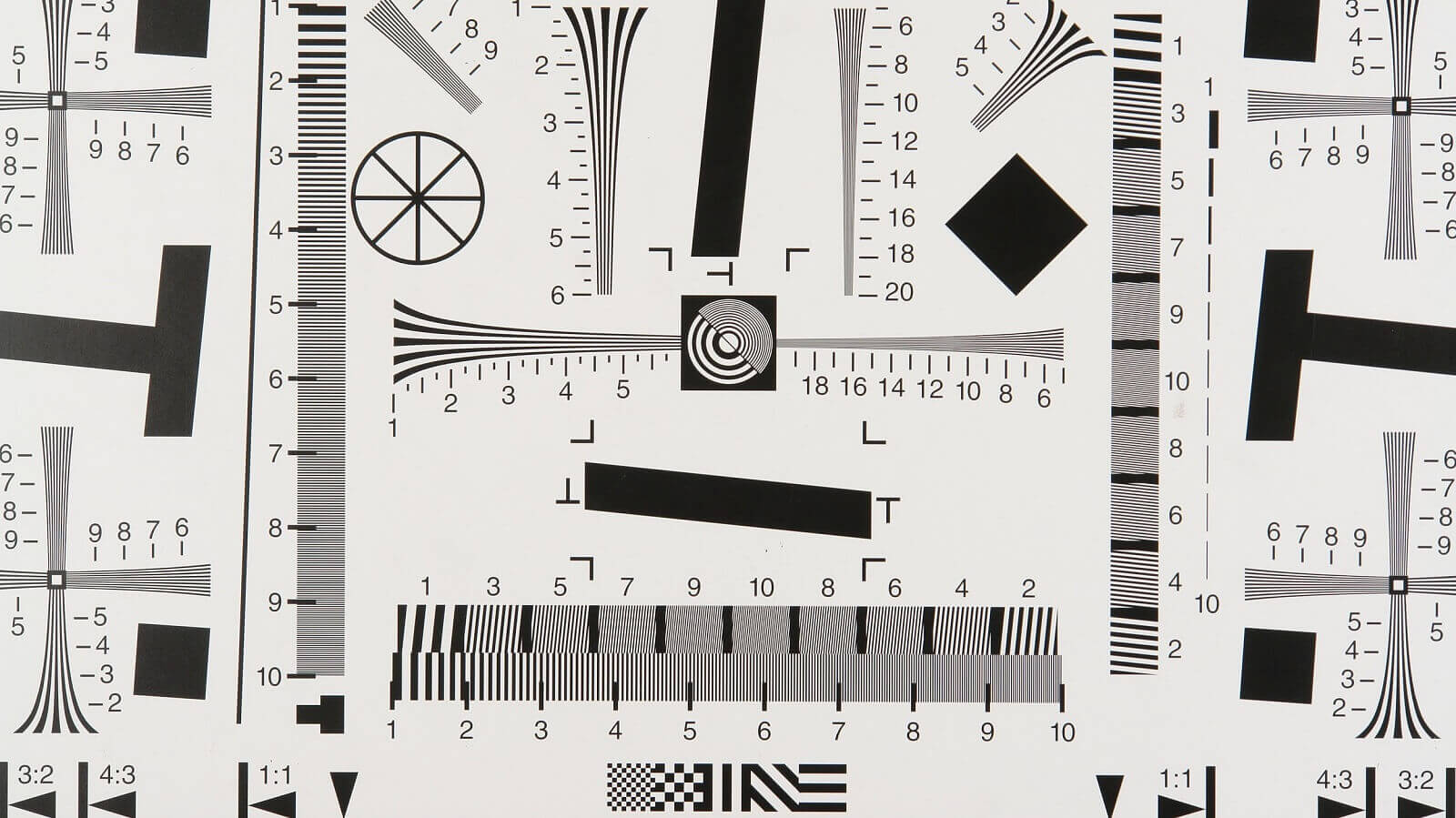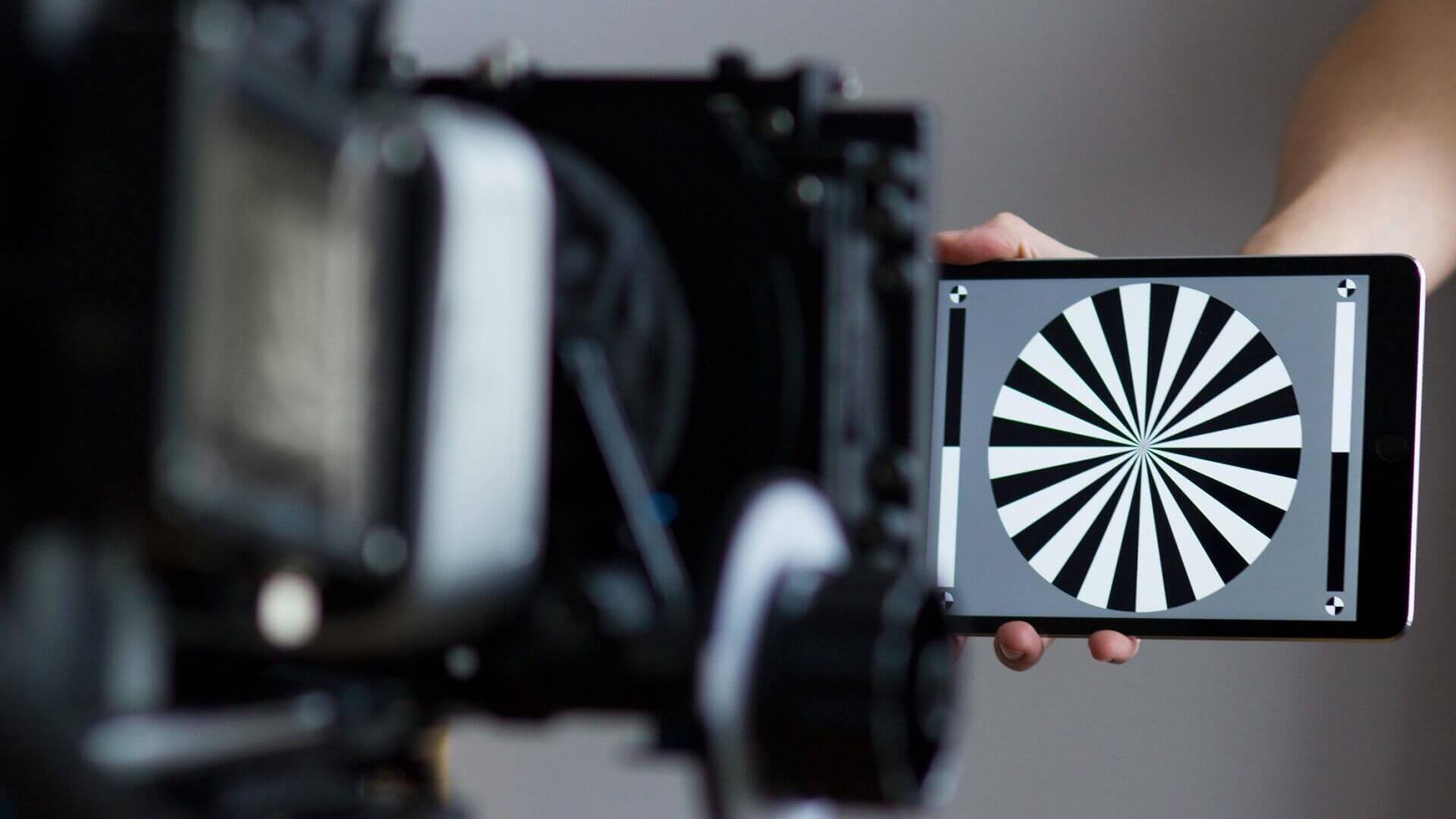Before you yell, “Action,” you need to make sure the subject in your frame is in the sharpest, cleanest focus possible. This is known as critical focus, and it makes all the difference in having a professional-looking video and an amateur one. You need the right tools on-set to properly calibrate your camera. Right now, you may ask yourself, “What is a focus chart?” But by the end of this post, you’ll understand why you need to acquire one immediately.
UNDERSTANDING A FOCUS TEST CHART
First, let’s define focus chart
Whether you call it a focus chart, Siemens star, or spoke target, it all does the same thing. It helps you get the best focus possible, especially when you have a shallow depth of field.
FOCUS CHART DEFINITION
What is a focus chart?
A focus chart is essentially a target for your camera to lock on to. It provides you with several different areas you can zoom in on to get the precise focus you require. A focus chart helps immensely with testing a camera’s autofocus and calibrating lenses. It also assists with determining whether your camera or lens has any chromatic distortions.
You normally see focus charts in controlled studio environments. In most cases, they come in handy when doing a low-light shoot or capturing inanimate objects.
How to Use a Cinematography Focus Chart • Upper State
Have you ever taken a picture or shot a video and noticed your subject was a little blurry? It may not be noticeable if you quickly glance at a frame. But when you really focus, it’s all you can see. A sharp focus does away with that blurriness and directs the audience’s attention directly to your subject.
There are various ways to go about achieving the sharpest focus possible. Modern Canon cameras allow you to adjust the focus within the camera itself, as demonstrated in this tutorial.
Nail Critical Focus • Photography Tips
But some filmmakers will want to stick with a good, old-fashioned lens test chart. It’s particularly useful when you need a shallow focus where the subject is crisp but the background is blurry. And there are a few ways you can go about acquiring a focus chart for your next project, which should look a little something like this.

Focus Chart • StudioBinder
UTILIZING A LENS CALIBRATION CHART ON-SET
How to adjust auto focus on a camera
In the event you don’t have a back focus chart and are in a bind, you could auto focus your camera without needing extra tools. To do this, you need to recalibrate the camera to maintain a sharp focus.
To do this, get the following.
- Coffee table
- Poster board
- Pen
- 2 rulers
From there, just follow these steps.
Set up your target area
You’re going to create your very own camera focus calibration chart by drawing a thin line on the poster board. You can place this poster board on the coffee table, but you just want to make sure it doesn’t go anywhere. You don’t want any movement when you’re trying to auto focus your camera.
Place rulers next to the line
Once your camera has the line focused, you want to set up two rulers on either side of the line. As you set down the rulers, be very careful not to move anything on the table.
The rules should each be touching the line at the same measurement. For example, you would want to set them up each at the 20cm point.
Take a picture
Once you have your scene set up, take a picture. More than likely, some of the numbers on a ruler will have a sharper focus than the line. This means your camera’s auto focus is drawn too far away from the center. And you need to adjust accordingly.
Go into your camera’s menu
To correct this, go into your camera’s menu. Select “AF” and then “AF Micro Adjustment.” Move down to “Adjust by Lens.”
A graph should come up at that point. Using this graph, you can pull the focus back or span it out depending on how your initial image came out.
Take another picture and adjust as needed
Once you alter the focus, you should take another picture. Hopefully, the line is now in focus. If it’s not, then you can go back into the menu and continue adjusting until it’s just right.
How to Calibrate a Lense Without Buying a Tool • Karl Taylor
The video offers the same guide so that you can get the focus you need directly from your camera. While it’s easy enough to get some poster board and pens, you may want a tool if you plan on going on a more professional shoot. That’s where having an autofocus calibration chart really comes in handy.
BACK FOCUS CHART DOWNLOAD
How to use a focus chart
When it comes time to use your camera focus chart, you follow the same steps as though you were calibrating your camera with a straight line like in the example above. You start by putting the chart in front of your camera. It should fill up the entire frame.
From there, you can still if your camera lens has a consistently sharp focus across the frame or if it becomes blurry in certain areas. You can rack focus until it’s just the way you want it. You can also go into the focus settings if the focus is too close or too far away.
That’s pretty much it. Focus charts are handy little tools designed to help cinematographers ensure the image is as crystal clear as possible. And with affordable options out there, you can get the perfect one for your next shoot.
BACK FOCUS CHART
Download a camera focus chart app
Distant Blue has created an app that gives you a perfect back focus chart download. And the app is appropriately called just “Focus Chart.”
It’s only available on the App Store, so you’ll need an iPhone or iPad to download it. It’s completely free, so you can use your phone as a focus chart on your next project. The app features two different charts you can use, and you can easily swipe back and forth between the two depending on which you prefer. It’s an ideal tool for cinematographers and filmmakers on a budget.
Related Posts
FOCUS CHART IN HIGH RESOLUTION
Print out your own DSLR focus chart
In the event you want a physical focus chart to hold (in case your phone runs out of power halfway through a shoot), then you can make your own focus test chart using Adobe Illustrator. The YouTube channel VideoRevealed breaks down how to do this step-by-step.Create Your Own Focus Chart in Adobe Illustrator • VideoRevealed
You get a free trial of Adobe Creative Cloud when you sign up. So you can download it to your computer, make your focus adjustment chart, and unsubscribe when you’re all done without having to pay anything extra. This way you have a physical focus chart handy any time you're on-set.
ARRI FOCUS CHART
Purchase a focus test chart
If you have some money burning a hole in your pocket, you could always buy a focus chart. A quick Google search reveals that these charts vary in price significantly. A cheap focus chart card may only cost you about $14, but some of the higher-end options cost over $1,000.
For most filmmakers, we recommend downloading the app or printing out your own. Any amount of money that could go toward a focus chart could be better spent elsewhere. But no matter which route you pursue, you just want to remember to always have some kind of focus chart available so that you have the cleanest shots possible.
UP NEXT
Ultimate Guide to Camera Focus
Different shots necessitate different focal lengths. Do you need a deep focus or a shallow one? How do you even know when to use each kind? Luckily, our guide to camera focus fills you in on the intricate details so that your shots look clear when they need to be and fuzzier in other instances.
Up Next: Ultimate Guide to Camera Focus →
Share your vision with elegant shot lists and storyboards.
Create robust and customizable shot lists. Upload images to make storyboards and slideshows.
